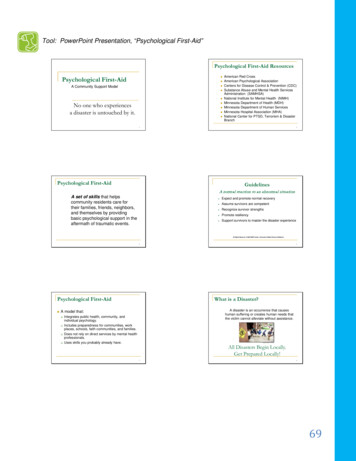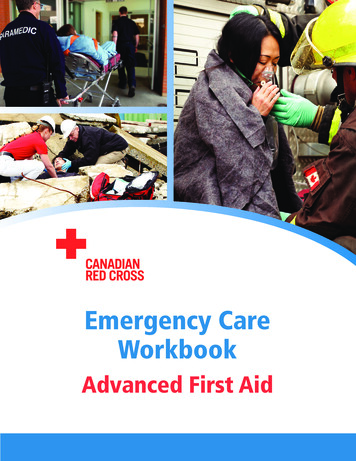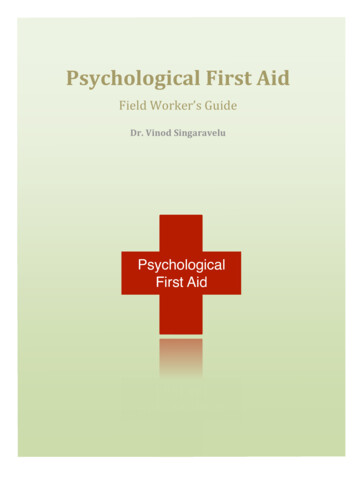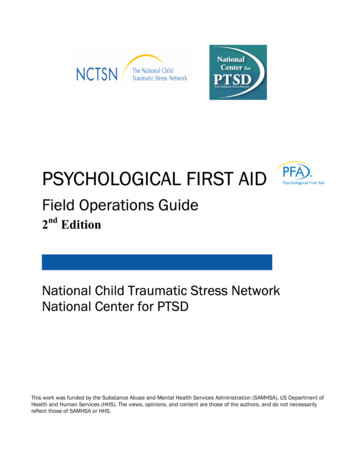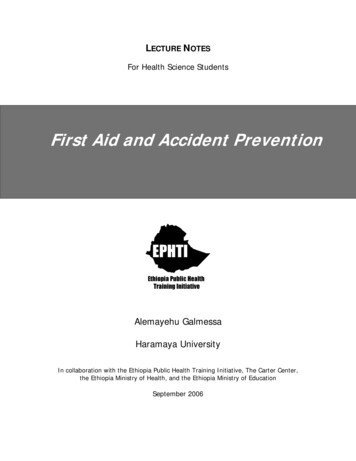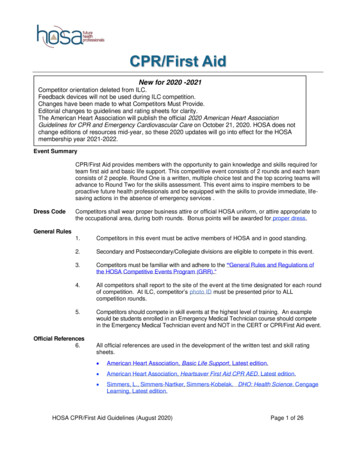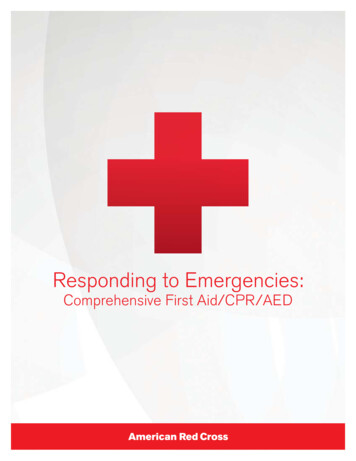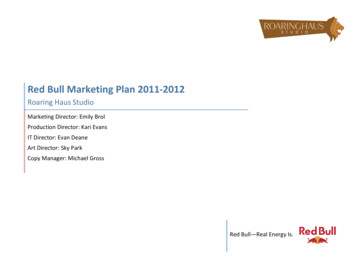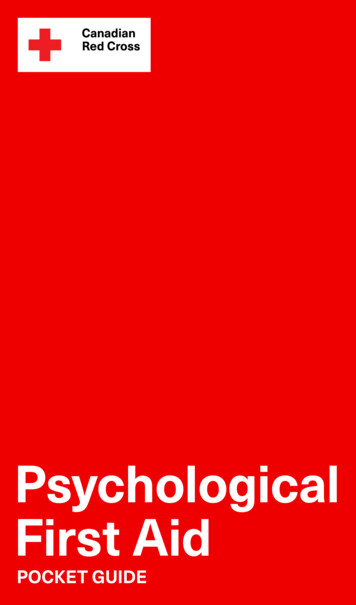
Transcription
PsychologicalFirst AidPOCKET GUIDE1
This booklet is not intended to replace properPsychological First Aid training.All rights reserved. No part of this publication maybe reproduced, stored in a retrieval system, ortransmitted, in any form or by any means, electronic,mechanical, photocopying, recording, or otherwise,without prior written permission from The CanadianRed Cross Society.The Canadian Red Cross Society has madereasonable efforts to ensure the contents of thispublication are accurate and reflect the latest inavailable scientific research on the topic as of thedate published. The information contained in thispublication may change as new scientific researchbecomes available. Certain techniques describedin this publication are designed for use in lifesavingsituations. However, the Canadian Red Cross Societycannot guarantee that the use of such techniques willprevent personal injury or loss of life.ISBN: 978-1-55104-821-5Copyright 2019 The Canadian Red Cross SocietyThis publication is available in English and French.2
Table of ContentsGet Help.What is Psychological First Aid?.Who, What, Where of Psychological First Aid.The Cycle.04050607Self-Care. 08Self-Care Plan. 09Stress Assessment. 10Support Systems. 12Personal Factors. 13Look, Listen, Link and Live. 14Care for Others. 16Psychological First Aid for Others. 17Look. 18Listen. 18Link. 19Live. 20Do No Harm. 21Psychological First Aid. 23Glossary. 243
Get HelpIf you are in crisis, please call9-1-1 immediately or locate aCrisis Centre in your region.Additional Resources: If you need help but are not sure where to turn,consult with your healthcare provider or anothertrusted professional. For more information, you may alsophone 211 or visit 211.ca to access community,social, non-clinical health and relatedgovernment services. For Kids and Teens: KidsHelpPhone.ca 1-800-668-6868 For Adults: Canadian Mental Health Association cmha.ca4
What is PsychologicalFirst Aid?First aid for the mind and our social networks is justas important as first aid for the body.Learning psychological first aid skills for mentalhealth crisis could save a life.Psychological First Aid (PFA) provides emotionaland practical support to individuals, families,or communities who are having difficulty coping.It is about establishing a connection with peoplein a compassionate non-judgmental manner to bringcalm and comfort.It also helps to reduce stigma associated withmental health crises and can reduce negative healthoutcomes through general public and communitybuilding strategies on self-care and promotingconversations about wellness.5
Who, What, Where ofPsychological First AidWHOAny distressed person.WHATBefore, during, or immediatelyafter a crisis event.WHEREAnywhere it is safe, but privacy is importantin some situations.6
The CycleLOOKAwareness that there is a problem; what doesstress look like in ourselves or others.LISTENListening to the warning signs in yourself or others.LINKLinking to your self-care plan or resources inyour community.LIVELiving fully, bouncing forward.7
SELF-CARE8
Self-Care PlanUnderstanding and taking care of yourself is a criticalpart of providing Psychological First Aid.It is difficult to support someone else if you are nottaking care of yourself. Your self-care plan identifiesthe support systems and protective factors you willuse to manage stress to maintain your physical,mental, and emotional health. It is something thatshould be revisited regularly and will likely change.9
Stress AssessmentDay-to-Day Stress Self-Assessment QuestionnaireDo you frequently do any of the following?Choose all that apply.Neglect your dietTry to do everything yourselfAnger easilySet unrealistic goalsNot find the humour in situations others find funnyBecome easily irritatedMake a “big deal” of thingsComplain that you are disorganizedNeglect your emotionsNeglect exerciseHave few supportive relationshipsNeglect sleep or restBecome angry when you are kept waiting10
Ignore signs of stressProcrastinateThink there is only one right way to do somethingNeglect to build relaxation into every daySpend a lot of time complaining about the pastRace through the dayFeel unable to cope with all you have to doTotal:Results:1–6 Your basic stress level is low and easilymanaged.7–12 You have fairly good stress managementon a day-to-day basis.13–17 Your basic stress is high and above acomfortable level.18 You have enough factors to put you indistress and should seek help.11
Support SystemsWhat links do you have access to within yourRelationships, Community, and Culture and Societysupport systems?ture and s12
Personal FactorsIf you know you will be entering a stressfulenvironment, it’s helpful to identify your personalfactors beforehand. They work together to keep youbalanced. Some of these factors will be the linkswithin your self-support sSpiritualEmotionalProfessional13
Look, Listen, Link and LiveUse the cycle to keep you safe.Look for common signsthat indicate stress: Physical (stomach ache, tiredness) Mental (difficulty concentrating) Emotional (anxiety) Spiritual (loss of faith) Behavioural (recklessness, increased useof alcohol or drugs) Interpersonal (withdrawn or in conflict with others)Listen to howyou are feeling: Acknowledge feelings and make no assumptions. Am I tired even though I’ve had enough sleep? Am I easily irritated by other people? Do I feel increasingly critical, cynicalor disengaged?14
Link to the support systems in placeto help cope with stress. Self: Actions you do individually to cope withstress (go for a run or listen to music). Relationships: Healthy relationships with family,friends, Elders and/or colleagues (a mentor). Community: Neighbourhood, club, workplace,or volunteer organizations. Culture and Society: Cultural traditions or religionand societal systems in place to protect you.Live with coping strategies in place so youcan continue living! Strategies include: Taking breaks. Developing realistic work expectations. Listening to and supporting your team. Maintaining healthy habits(eating, sleeping, exercising). Practicing stress management techniques(breathing or mindfulness). Maintaining healthy relationships. Asking for help if you need it.15
CARE FOROTHERS16
PsychologicalFirst Aid for OthersMany of the same tools you would use whentaking care of yourself are used when providingpsychological first aid to others who may beexperiencing loss or grief after a trauma.Loss: Loss comes in many forms. It may be thedeath of a family member, friend, or pet, or theloss of a home, job, sentimental items, way of life,or a community.Grief: When responding to people who are grieving,be sure to do the following: Reassure them that what they are feelingis to be expected. Avoid defining what they should be feeling ordoing. There is no right way to grieve. Avoid making judgments. A person who is grievingmay display strong emotions or no emotions at all. Do not take others’ emotions personally. Allow people time to process their emotions.Pressuring them to move on will not help.There is no timetable for grieving.17
LookThere are seven things you need to look for whencaring for others: Signs of stress. Signs of distress (uncontrollable sobbing, inabilityto care for basic needs, silence, delusions). Nonverbal signs of communication. Basic needs covered. Signs of violence. Those requiring special attention. Resiliency.ListenApproach people and ask them about their needsand concerns to determine what kind of supportthey may need.Ensure you carry out the following principleswhen listening to others:Be calm: When approaching someone, be sureyou are calm.Be open: When asking if you can help, be opento listening to the person’s experience.18
Make no assumptions: Check your understandingas well as supporting and empowering others byproviding accurate information, acknowledging theirjourney, and encouraging healthy coping strategiesand decision-making.Listening Tips: Be present and respectful. Be compassionate. Consider the person’s age, gender, culturalbackground, etc. Pay attention to verbal and nonverbalcommunication. Leave space for silence. Empathize. Be aware of tone and inflection of voice.LinkThere are four important considerations to makewhen supporting and linking people in crisis: Resources to meet basic needs. Accurate information. Loved ones. Social, cultural, and faith support networks.19
Your goal is to empower someone to link into theirself-care plan or another resource if they are unable to.You should learn about the resources that are availableand the referral information in your community.You have a legal obligation to report if someone is atrisk of harm (from themselves or others) and get theperson appropriate support. This includes knowingthe following information: Your own organizational or workplace policies Provincial/territorial child protection policies Emergency medical services (EMS)/9-1-1 or acommunity crisis lineLiveHere is where you return to self-care and buildresiliency in yourself. It is important to take care ofyourself before, during, and after a stressful experience.Self-care is an essential component tosupporting others!You may find it helpful to retake the self-assessmentquestionnaire as a way to check in with yourself. How do you feel? Do you need to link to any of your supports?20
DO NO HARM21
Do No HarmThe principle of Do No Harm originates in emergencymedicine. It reminds healthcare providers that theymust consider the possible harm that any interventionmight do to a patient.In Psychological First Aid, it refers to the unintentionalharm that may be caused to those who are supposedto benefit from your intervention.To create safer environments while helping others,use the Do No Harm Principles to inform your actions.Protection: We must provide safe environmentsby linking people to protective services both in andout of their self-care plan.Respect: People come from different places andhave different experiences than you. Respect thatthey may not share your views.Integrity: Do what you say and respect people’sprivacy and confidentiality.Dignity: Strive to maintain the dignity of othersand provide them with time and space if needed.Empathy: Be aware of a person’s feelings and tryto see things from their perspective.22
Thank You!Psychological First Aid can be used before, during,or after a crisis event. It allows for a holistic approachto health, where individuals learn how to care forthemselves and others’ psychosocial wellness.Thank you for taking the time to learn more aboutPsychological First Aid.23
GLOSSARY24
Glossary:Active listening occurs when you make a consciouseffort to not just hear words, but to understand thecomplete message being communicated. (Thecomplete message is communicated through bodylanguage and tone of voice in addition to words.)Burnout is an emotional state due to long-termstress, characterized by chronic emotionalexhaustion, depleted energy, impaired enthusiasmand motivation to work, diminished work efficiency,a diminished sense of personal accomplishment,pessimism, and cynicism.Compassion fatigue is the gradual lessening offeelings of compassion toward those needing help.Coping is the process of adapting to a new lifesituation, managing difficult circumstances, makingan effort to solve problems, or seeking to reduce ortolerate stress or conflict.A crisis event is an event outside of ordinaryexperiences that causes feelings of powerlessness,helplessness, or fear.Cumulative loss consists of multiple lossesoccurring at the same time, or directly one afteranother, leaving the individual overwhelmed andwith no time to process afterwards.25
Cumulative stress occurs when the sources ofstress continue over time or happen all at the sametime and interfere with regular patterns of living.This type of stress can send a person into distress.Day-to-day stress is made up of challenges inlife that people face daily. This can be positive(motivating) or negative.Duty of care is the legal obligation where, if someoneis unsafe or needs help, you have a responsibilityto link them to support.Extreme/traumatic stress occurs when we arefaced with severe or sudden strain; may result inan emotional crisis.Grief is a natural process that is a response tosorrow and loss.Psychological First Aid (PFA) is humane,supportive, practical—and sometimes preventative—help to those suffering crisis events and experiencingoverwhelming stress.Resiliency is the ability, based on skills, knowledge,experience, actions, and behaviour, to cope andrealign from an adverse experience.26
A self-care plan identifies the internal andexternal support systems you will use to managestress in order to maintain your physical, mental,and emotional health.Stress is a normal response to an abnormal physicalor emotional situation. Stress occurs when demandsare out of balance with our resources for coping.Sudden loss occurs without warning and leavesno opportunity to prepare.Support systems are the biological, psychological,and social factors within a person and theirrelationships, community, culture, and society thatallow the person to cope with the effects of stress.27
redcross.ca/pfaSign up for an online course in Psychological First Aid.shop.redcross.caVisit our online shop for first aid items and emergencypreparedness kits.redcross.ca/appsDownload the free First Aid App and get instant access tovideos, interactive quizzes, and simple, step-by-step advice.redcross.ca/volunteerLearn more about Red Cross volunteer opportunitiesin your community.Red Cross First Aid.The Experience to Make a Difference.ISBN: 978-1-55104-821-528
First Aid? First aid for the mind and our social networks is just as important as first aid for the body. Learning psychological first aid skills for mental health crisis could save a life. Psychological First Aid (PFA) provides emotional and practical support to individuals, f
